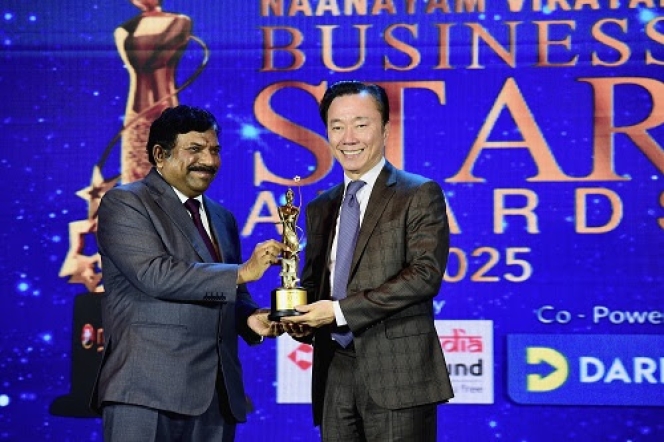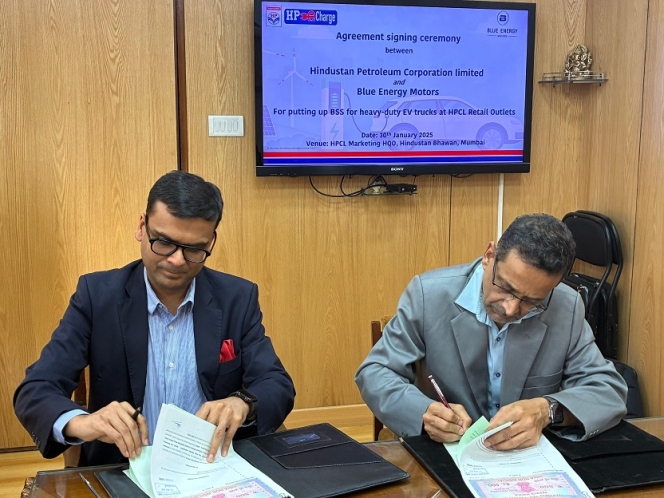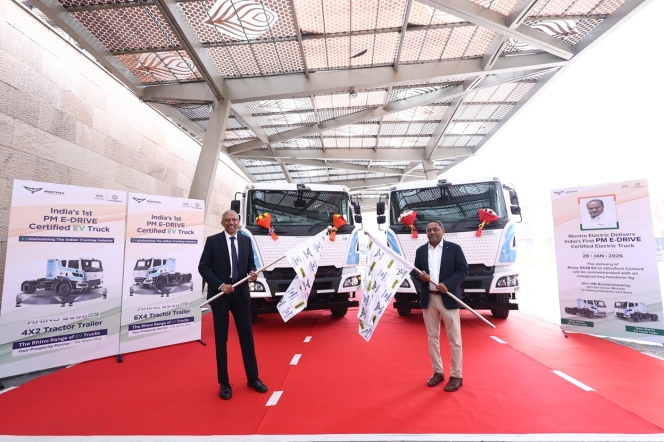
Like an IC engine automobile where the engine and the driveline make up the key aggregates, in EVs the key aggregates are the battery and the motor. While an IC engine may account for 23 to 30 percent of the total cost and the driveline component such as a gearbox, propeller shaft, transaxle or a differential may together cost another 15 to 20 percent of the total vehicle cost, in the case of an EV, it may not be that simple.
It is therefore necessary to find out about the battery and motor replacement cost before buying an EV. A young Canadian owner – Kyle Hsu – of Hyundai Ioniq 5 was thrown out of his seat almost when he found out that the warranty was void on the battery pack of his one-year-old electric vehicle and it would cost him a little over $ 60,000 to replace it! The car was bought in 2022 for $ 56,000.
Hsu was driving to the interior of British Columbia, according to the YouTube channel Motormouth which has highlighted the development, when he avoided something on the road. On the cautionary side, he dropped at the dealer to get the car checked after he returned from the trip.
The battery cover underneath the e-car was founded to have been scratched. The dealer conveyed that the battery behind the cover had been impacted and should be replaced since it may explode. It was not repairable.
Hsu took the help of the insurance company once he was told that it would cost over $ 60,000 to replace the battery. The insurance company told him that his vehicle IDV was less than the cost of replacing the battery. If he were to choose to replace the battery, the insurance costs were likely to go up by 50 percent despite his clean driving record.
Responding to Motormouth, the Hyundai Canada PR Manager Jennifer Mcarthy is known to have said that it amounts to a very rare situation and Hyundai Canada’s customer experience team should have had the opportunity to access the situation prior to sharing of costing.
The cost of battery replacement depends on the nature of the damage, type of battery and repairs required. There is no one set price for ever replacement while battery cost is a challenge for the business. Pricing strategy for batteries that is reasonable, fair and in line with market competitiveness is being worked on, Mcarthy is known to have expressed further.
In his column in The Guardian newspaper recently, actor and automobile enthusiast Rowan Atkinson stated that he loves electric vehicles and was an early adopter. He however felt increasingly duped.
An electrical and electronic engineer by education, Atkinson is of the opinion that electric motoring does not seem to be quite the environmental panacea it is claimed to be.
Stating that electric cars have zero exhaust emissions, which is a welcome development, particularly in respect of the air quality in city centres, Atkinson said in his column, if you zoom out a bit and look at a bigger picture that includes the car’s manufacture, the situation is very different. “The problem lies with the lithium-ion batteries fitted currently to nearly all electric vehicles: They’re absurdly heavy, huge amounts of energy are required to make them and they are estimated to last only upwards of 10 years,” he averred.
Drawing attention to solid-state battery development, Atkinson expressed that if hydrogen wins the race to power trucks and as a result every filling station stocks it, it could be popular and accessible choice for cars.
Till then, keeping the old petrol vehicle may be better than buying an EV since it costs far less to make and can last for 30 years with tender loving care.
If the majority of the first owners would retain their vehicles for over five years, it would result in an amount of CO2 reduction brought about by new cars being put on the road. The entire chain of raw material selection to manufacture, to the end of the road has its share of carbon emissions.
Though it may be better to reduce our reliance of IC engine vehicles, it would be worth considering that the existing vehicles have already paid their environmental dues – cost to the environment – during their manufacturing process. A lot of technological development has also made them far less polluting and reliable than they were a few years or decades ago.
Also, the possibility of writing off a one-year-old EV because its battery replacement cost exceeds the vehicle purchase cost is countered by the engine, gearbox or a body part being repairable in case of an IC engine vehicle.
Many of you would also remember the head honchos of some auto companies in India saying that BS VI emission compliant vehicles will only emit water through the tailpipe and will be cleaner than the ambient air.
The time is ripe to understand what is ‘actually’ environment friendly, an EV or an IC vehicle. The time is right to test and analyse if it the automobiles that are causing more pollution in Indian cities or there are other sources. An air filled with so much dust does not seem like the handiwork of automobiles rather than the gigantic civil projects that being worked on.
- VinFast
- Investor of the Year
- Urban Electric Vehicle of the Year
- VinFast VF 7
- Motor Vikatan Awards 2026
VinFast Wins Dual Honours In India For Investment And Electric SUV
- By MT Bureau
- January 31, 2026

VinFast’s strategic progress in India has been further validated through recent accolades from the influential Vikatan Group media network. The company was distinguished with two significant awards: one recognising its substantial investment commitment, and the other honouring its VF 7 model as the premier urban electric vehicle for 2026. These commendations underscore the brand’s deepening integration into the Indian automotive sector, highlighting both its industrial strategy and its product relevance.
The title of Investor of the Year, conferred by Nanayam Vikatan business magazine, specifically acknowledges VinFast’s landmark commitment to establishing an electric vehicle manufacturing facility in Thoothukudi, Tamil Nadu. This project is noted not only for its scale and strategic clarity but also for its anticipated role in fostering a new industrial corridor, generating employment and bolstering the local supplier network. It aligns with national initiatives like Make in India and reflects confidence in the region’s manufacturing potential.
Concurrently, the VF 7 electric SUV was named Urban Electric Vehicle of the Year at the Motor Vikatan Awards 2026. This recognition from automotive experts underscores the model’s successful adaptation to India’s urban driving conditions, balancing design, performance, safety and comfort. It serves as a testament to VinFast’s product development focus and its localisation strategy aimed at meeting specific market demands.
As a respected media institution in South India with a legacy dating to 1926, the Vikatan Group’s awards carry considerable weight among businesses and consumers. These latest honours add to a growing list of VinFast’s achievements in the market, illustrating the convergence of its investment, manufacturing, and product efforts. Within a short timeframe, the company has employed a long-term strategy encompassing manufacturing, retail, charging infrastructure and after-sales services. Through this comprehensive approach and a focus on sustainable innovation, VinFast is steadily building its brand presence while contributing to India’s transition towards green mobility.
Pham Sanh Chau, CEO, VinFast Asia, said, “Being recognised in two important award categories demonstrates how VinFast is steadily building its position in India, not only through long term investment commitments but also through products developed to match local conditions and user needs. This recognition provides further momentum for us to accelerate implementation, expand the electric vehicle ecosystem, and maintain a long-term partnership with the Indian market.”
B Srinivasan, CEO, Vikatan Group, said, “VinFast India represents the new-age investor – bold in vision, swift in execution and deeply aligned with India’s growth story. By unravelling the true potential of the port city of Thoothukudi, VinFast India has helped create a conducive industrial ecosystem, played a positive role in employment generation and restored the city’s importance on India’s manufacturing map. Their investment is not just capital at work but confidence in India’s future.”
Blue Energy Motors And HPCL Forge Nationwide Pact For Electric Truck Battery Swapping
- By MT Bureau
- January 30, 2026

Blue Energy Motors and Hindustan Petroleum Corporation Limited (HPCL) have entered a strategic partnership to deploy Battery Swapping Stations for electric commercial trucks at select HPCL fuel outlets nationwide. This initiative leverages HPCL’s extensive network of over 24,400 retail locations to create a widespread and convenient energy infrastructure for freight operators. By situating swap stations within established fuelling hubs, the collaboration seeks to make electric mobility a practical and scalable reality for India’s logistics sector.
The core advantage of battery swapping lies in its dramatic reduction of energy replenishment time to under five minutes, minimising vehicle downtime compared to conventional charging. For fleet operators, this efficiency translates into higher vehicle utilisation, improved productivity and more predictable scheduling. Furthermore, a growing and accessible network of swap stations alleviates range anxiety, enabling electric heavy-duty trucks to confidently undertake longer routes and multiple shifts.
As India advances its green transportation goals, this alliance holds significant strategic value. HPCL’s vast retail footprint, which already supports over 5,400 EV charging points under its HP e-Charge brand, offers a ready platform for rapid infrastructure deployment across key freight corridors. Blue Energy Motors, a pioneer in zero-emission freight solutions, brings its expertise in electric commercial vehicles, exemplified by its launch of India’s first electric freight corridor. Together, the companies aim to accelerate electric vehicle adoption by directly addressing the operational needs of commercial fleets, thereby strengthening the long-term development of sustainable freight transport in the country.
- Eicher Trucks and Buses
- VE Commercial Vehicles
- VECV
- India Book of Records
- IBR
- Eicher Pro X
- Vinod Aggarwal
- SS Gill
- Abhishek Chaudhary
Eicher Pro X EV Completes Kashmir To Kanyakumari Journey In 6 Days
- By MT Bureau
- January 28, 2026

Eicher Trucks and Buses, part of VE Commercial Vehicles (VECV), has completed a journey from Kashmir to Kanyakumari using its Eicher Pro X EV.
The record verified by the India Book of Records (IBR), saw the electric vehicle cover over 4,000 kilometres in 6 days under loaded conditions. The run commenced in Srinagar on 20 January 2026 and concluded in Kanyakumari on 26 January 2026, traversing the Himalayas, plains and the Deccan Plateau.
Throughout the expedition, the vehicle utilised public chargers located via the MyEicher App. An adjudicator from the India Book of Records accompanied the truck to monitor route compliance, load, distance and charging stops. The mission served as a demonstration of electric vehicle endurance across diverse altitudes and climates to validate the technology for logistics corridors.
The journey was intended to show that electric commercial vehicles can operate beyond short-haul deliveries. By maintaining performance across hilly and coastal routes, the Pro X EV aimed to establish total cost of ownership (TCO) benefits and maintenance predictability for fleet operators. The successful completion of the route suggests that current charging infrastructure can support long-haul electric freight movement.
Vinod Aggarwal, MD & CEO, VE Commercial Vehicles, said, “For more than four decades, Eicher trucks and Buses have earned customer trust through leadership in fuel efficiency and application-specific engineering. The record-setting performance of the Eicher Pro X reinforces our unwavering focus on application excellence, reliability, and performance, anchored in robust product development and manufacturing capabilities, and enabled by a customer-centric, pan-India commercial and dealer network. I commend the entire Eicher team for achieving these well-deserved records”.
SS Gill, Chief Commercial Officer, VE Commercial Vehicles, said, “By covering the K2K route with a loaded Pro X EV, Eicher Trucks & Buses has proven that electric mobility is no longer restricted to short-haul, ‘last-mile’ deliveries. We are not just setting records, but through the strength of our service network and extensive dealer set-up, we are demonstrating that our EV technology is commercially viable, reliable, and has the range to serve as the backbone of India’s green logistics corridors”.
Abhishek Chaudhary, SVP – SCV Sales & Marketing, VE Commercial Vehicles, said, “The Eicher Pro X EV was put to the ultimate test – covering over 4000 kilometres across diverse climates and challenging altitudes. With this recognition from the India Book of Records we’ve moved beyond our own stringent testing benchmarks to real-world validation - Demonstrating that Eicher Pro X EV is a dependable partner for logistics movement across varied operations in India”.
- Montra Electric
- Murugappa Group
- PM E-Drive Scheme
- Rhino 5538 EV 6x4 Tractor trailer
- Narendra Modi
- H D Kumaraswamy
- Arun Murguappan
- Sathia Raj
- UltraTech Cement
Montra Electric Becomes First OEM To Receive PM E-Drive Certification For Heavy Trucks
- By MT Bureau
- January 28, 2026

Montra Electric, the electric medium and heavy commercial vehicle business of the Murugappa Group, has become the first manufacturer in India to receive certification for heavy-duty electric trucks under the government's PM E-Drive Scheme.
To mark the achievement, the company delivered a Rhino 5538 EV 6x4 Tractor trailer to UltraTech Cement. The handover took place in the presence of Arun Murugappan, Chairman of Montra Electric and Sathia Raj, Chief Procurement Officer of UltraTech Cement.
The PM E-Drive scheme includes a budget of INR 5 billion specifically for electric trucks, providing a benefit of up to INR 960,000 per vehicle for the Rhino 5538 EV. This incentive is intended to lower operating costs and reduce exposure to fuel price volatility for fleet operators in the logistics, mining, and manufacturing sectors. The Rhino 5538 EV range is designed for Indian conditions and is available in 6x4 and 4x2 variants.
The Rhino 5538 EV 4x2 variant features a 282 kWh LFP battery that produces 380 HP and 2000 Nm of torque. It offers a range of approximately 198 km under standard test conditions and supports six-minute battery swaps. These specifications suit the vehicle for high-utilisation applications in ports, steel plants, and cement logistics.
H D Kumaraswamy, Union Minister for Heavy Industries, said, "The PM E-Drive scheme is a testament to the growing prowess of Indian innovation in the heavy-duty electric vehicle segment. Under the visionary leadership of Prime Minister Narendra Modi, we are committed to decarbonizing our logistics and making India a global hub for EV manufacturing. Electric trucks are pivotal to our Net Zero goals, and by fostering a self-reliant ecosystem through such certifications, we are driving the spirit of Atmanirbhar Viksit Bharat. We are very happy to see our Prime Minister’s vision coming to life with the 1st PM E-Drive certified heavy duty electric truck from 'Montra Electric' getting delivered today."
Arun Murugappan, Chairman, Montra Electric, said: “Decarbonising freight is one of the most critical challenges in India’s energy transition. We are grateful to the Government of India and our Prime Minister Narendra Modi for introducing forward-looking and progressive policy frameworks such as the PM E-Drive Scheme, which represent a welcome and transformative step in accelerating this shift, particularly in heavy commercial vehicles where emissions intensity is high. At Montra Electric, we are proud to contribute to this national mission by delivering technologically advanced, reliable, and scalable electric M&HCV solutions that can drive meaningful and lasting change in India’s mobility ecosystem.”








Comments (0)
ADD COMMENT